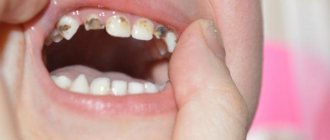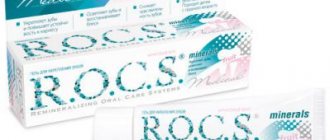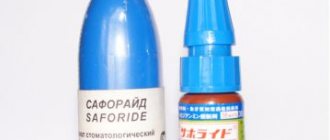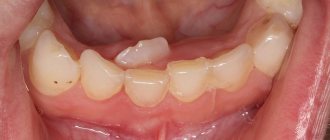Good day, dear readers. If you have young children, then most likely you have heard about different dental procedures for them. Many parents who complain about the poor condition of their children’s teeth can be offered options for solving this problem. Among them is such a popular technique as silvering teeth.
Silvering of baby teeth
As is known, the chemical element silver (Ag) has antibacterial properties, and the main cause of tooth decay, caries, is caused precisely by their activity. Of course, there are other reasons, including demineralization, which we will also look at as we study this topic.
Silvering and fluoridation of baby teeth
Why are teeth silvered in childhood?
Very often in order for frightened mothers to calm down at least for a while. The fear that a child's teeth will deteriorate/fall out prematurely haunts many young parents. After all, this is quite real and they see examples of similar situations among the children of their neighbors, acquaintances, and relatives.
Silvering of teeth in children
If we talk about a medical point of view, it is believed that silvering baby teeth helps in the prevention of caries and even stops its development in the initial stages. As practice shows, this technique often turns out to be quite effective.
What is silvering of teeth
Did you notice that I wrote “often”? The fact is that there are no two identical children who would be affected 100% equally by any method/drug used in medical practice. Pardon the tautology, but I can’t describe this simple fact any other way.
When silvering occurs, tooth enamel becomes noticeably darker. Therefore, this method is used for baby teeth, which will eventually fall out anyway.
Silvering teeth for children
For permanent teeth, this method of prevention is pointless. After all, the surface of the treated tooth does not look aesthetically pleasing at all.
Having discovered obvious signs of caries in their baby, parents run to the children's dental clinic or to private doctors with a request to stop the destructive process. It is very important that the child does not lose his baby teeth. This is where the pediatric dentist needs to decide whether to fill the tooth or silver plate it. For the front incisors, a filling is not the best option. She is holding up extremely poorly. The professionalism of the dentist plays a very important role. He should not choose a technique according to the principle “the more expensive, the better.”
Children's teeth after silvering procedure
Tips and tricks
- In order not to guess whether baby teeth need to be silvered or whether it is better to give preference to fluoridation and remineralization, it is necessary to show the young patient to the dentist. After the examination, the doctor will give a professional opinion on the condition of the oral cavity and advise which methods of combating the disease are best suited for a particular patient.
- Light inclusions or spots on the enamel are a sign of caries in the white spot stage. At this stage, doctors recommend using toothpaste with fluoride to cleanse teeth; this is usually enough to relieve the disease. You can also resort to remineralizing therapy, fluoridation and silvering.
- If the carious lesion affects only the tooth enamel, it is better to resort to fluoridation or remineralizing therapy. It is possible to silver your teeth, but the effectiveness of the procedure will be low.
- With average caries, silvering “delays” the development of pulpitis. But according to doctors, the most effective method of combating the disease at this stage is treatment and installation of a filling.
The best solution when detecting a carious lesion on a baby tooth is treatment and installation of a filling. But in cases where the baby does not make contact with the dentist, silvering procedures or alternative methods are recommended.
Causes
Why does the problem itself arise? It varies from person to person, but most often it’s due to diet and poor oral hygiene. For example, you give sweet juices and lemonades, especially at night. The result is obvious - caries. Does your child eat sweets and cakes? Sugars and carbohydrates are excellent “food” for bacteria that destroy his teeth.
What you can and cannot feed your baby at night
If the diet lacks calcium, vitamin D and other substances valuable for teeth, this can also cause destruction of enamel and other tissues.
- Silvering of baby teeth
Caries of baby teeth
Sometimes babies can have congenital enamel defects. In these cases, silvering is used to prevent future problems. But don’t be lazy to ask what else you need to do to protect fragile teeth.
Causes of caries in baby teeth
How is the teeth silvering procedure performed?
The doctor uses silver nitrate AgNO₃. Of course, not in its pure form, but in the form of a 30% solution. There are also more modern preparations that combine fluoride and silver. They have a pronounced effect in the fight against carious bacteria.
Silvering process
How it works? The drug forms a film of solid insoluble salts on tooth enamel, which not only defeat bacteria, but also prevent the destruction of the enamel even if there are spots on it (demineralization or the initial stage of caries).
The drug is applied for a few minutes, so it does not cause any discomfort. Complete painlessness is guaranteed during the use of the active ingredients.
Silvering of baby teeth
Video - Treatment of caries of temporary teeth using silver impregnation method
CONTRAINDICATIONS
Firstly, the procedure is not performed if there is deep damage to the dental tissue. The composition of the drug is not intended to affect the internal tissues of the molar and may cause harm instead of benefit.
Secondly, the procedure is not carried out if there are existing pathologies of dental tissue or allergies to medicinal substances included in the solution.
Thirdly, coverage is not possible for existing somatic pathologies.
Fourthly, age from three years. Older patients undergo different treatment, for example, using a drill and placing a filling.
How often do you need to silver your teeth?
According to pediatric dentists, the most effective effects of drugs containing silver are as follows:
- repeat silvering of teeth 3 or 5 times;
- this can be done in a row or every other day;
- It is optimal to do this every 4 months. If this is not possible - twice a year.
Silvering teeth in children has a positive effect in terms of protecting not only hard tissues (enamel), but also soft tissues (dentin). The frequency of repetition of procedures is individual for children of different ages. It also depends on how well oral hygiene is implemented and whether the child is fed naturally.
Boy with silvered teeth, teeth after silvering
Silvering of teeth - expert opinions on the technique
There are many different opinions among dentists. They constantly argue, arguing for and against silvering teeth, citing research.
Fact one - silver nitrate, if it penetrates deep into the tooth tissue, can damage the pulp.
One-component argenate - material for use in the initial forms of development of carious processes (liquid 5 ml)
What do doctors suggest? Nowadays, there are a lot of combination drugs that are effective, but safer.
Fact two - combination drugs contain fluorides, which, according to some scientists, can be harmful.
Benefits of silvering teeth
Dentists have differing opinions. Some say that the dose of this halogen is insignificant and cannot harm a person. Others argue that even microdoses that exceed the body's actual needs are a health threat.
- Silvering of teeth in children
- If caries has affected the chewing teeth, the procedure is unlikely to be beneficial.
- With advanced caries, there is also no guarantee that silver nitrate will be able to stop the process.
- Do not forget that the surface of the enamel will be covered with a brown or even black film.
Silvering of baby teeth “Pros” and “Cons”:
| Positive facts | Negative arguments |
| By silvering baby teeth in children, the procedure of drilling with a drill and further filling can be postponed until the future. Carious destruction is stopped | This procedure is not effective on the chewing part of the teeth and prevents the detection of caries. |
| The film formed on the surface layer of enamel after silvering protects against plaque and the proliferation of pathogenic bacteria | Silver teeth, when exposed to light, take on a dark tint. |
| The silvering procedure is simple and painless, and does not cause discomfort to the child. | In the stage of advanced caries, silver treatment is ineffective and can cause harm |
| The silvering workflow will not take much time. Small children can easily withstand and tolerate this procedure. | Thoroughly cleaning a child's teeth is an extremely difficult task. And before silvering, this action is necessary |
| Lowest price | To achieve the effect, you need to repeat the procedure more than once a year. |
Therefore, before going to the doctor, think about whether it is worth silvering your teeth or using another technique. As long as there is a small white spot on the tooth, it is not at all necessary to resort to radical measures. It may make sense to start the demineralization procedure. There are special products applied to the enamel for this purpose. You also need to make sure that the child brushes his teeth and eats properly.
Silvering of teeth in children
In the USA and most European countries, this technique is no longer used, being considered outdated. In the CIS, there are still few worthy alternatives that would be sufficiently effective and would not have side effects.
Do not forget that before applying silver preparations, soft and hard deposits must be completely removed from the teeth. When a three-year-old child sits in a dental chair, this is very problematic. He will spin around, avoiding what he considers “scary” medical instruments.
You cannot apply Saforite, Argenate or other products to unbrushed teeth. These two drugs are silver fluoride diamine - combination drugs that are considered the most modern and safe.
"Argenat"
It's important to know that. Unlike fluoridation, silvering teeth yourself at home is contraindicated. Considering that this procedure is not the most expensive, there is no point in violating the instructions of experts and self-medicating.
Minuses
- If you neglect to thoroughly clean your teeth before the procedure, it may not give the desired effect.
- After silvering at the site of application of the drug, the enamel acquires a stable dark or black color if solutions produced in Belarus and Russia are used. Treatment with Japanese “Saforaid” gives the teeth a light gray or brownish tint. It is impossible to return the previous whiteness. The blackening of teeth in the photo before and after silvering often makes parents doubt the need for the procedure.
- Treatment is time-consuming and the process cannot be completed in one day.
- There is a risk of pulp burns and allergies.
- Silver plating is not suitable for chewing teeth.
Other dental protection options
Most often, if there are no holes or significant damage on the tooth, experts may recommend fluoridation - regular or deep. Special pastes and other means are also selected to help stop the process of enamel destruction.
Fluoridation of teeth
The use of sodium fluoride is a popular alternative to silver plating, but this method is not a panacea. In addition, if your region has fluoridated water or there is a company whose activities are somehow related to fluoride emissions, the use of such techniques may even be dangerous. After all, poisoning with fluoride compounds causes fluorosis and other diseases.
In addition, fluoridation can only be done after 2 years, when the enamel is formed and strong enough. Otherwise, fluoride will cause a reverse reaction - softening of tooth tissue, which will accelerate their destruction.
Fluoridation of teeth in children
When choosing a technique, much depends on the professionalism of the doctor. His task is to determine which method will be relevant for each specific patient.
- Silvering of teeth in children
Video - Other options for protecting teeth
Silvering of teeth - what do parents write?
Having studied numerous reviews about teeth silvering written by mothers of babies, I came to the conclusion that doctors often prescribe this procedure simply for the sake of money. That is, they do this, fully aware of the fact that this will not help the child.
Child at the dentist
Not everyone wants their child to walk around with black teeth. Adults don’t care, but other kids will tease you. They don’t understand what this treatment is. Therefore, many mothers and fathers do not take risks, realizing that their teeth will not completely change tomorrow or even in a month. If a child goes to kindergarten and is the only one there with such teeth, expect to come home in tears.
The second point is the hereditary factor. It, like various situations during pregnancy, can affect the destruction of baby teeth no less than caries. No amount of silver will help you here. Many parents and dentists are faced with this problem, either they shrug their shoulders or use fluoride and silver on the principle of “what if it helps.”
Silvering does not always help
The third point is stress. Of course, silvering your teeth doesn’t hurt. Only now, if you are bringing a baby to the doctors who is barely one and a half years old, he will be very nervous.
There are also those parents who are delighted. They had the procedure done on time and, apart from black teeth, there were no negative consequences. The caries stopped, which means the method helped them. There are as many such reviews as those that talk about the uselessness of using this method.
Many children suffer from mineral imbalances. Without understanding it properly, dentists prescribe silver plating. Of course, there is practically no benefit from such work. After all, the problem is “internal” and has nothing to do with caries. Therefore, the destruction continues. To help a child in such circumstances, you need a competent, and most importantly, comprehensive approach, including:
- diet correction;
- prescription of vitamin and mineral complexes;
- external use of pastes and other means of demineralization of enamel;
Girl at the dentist
The most interesting thing is to read how, under pressure from worried parents, permanent teeth are silvered for seven-year-old children. This is nonsense and should not be done under any circumstances. Especially when it comes to caries of permanent teeth. They will not change and will remain black forever! It will be very difficult for the child when he grows up. What to do next? Should I get crowns or veneers after 18 years of age? Don't create additional problems for your children in the future.
Oral hygiene is very important
You can also advise trivial but important things - no matter how capricious children are or struggle, you should brush their teeth twice a day. Choose a good brush and toothpaste. When they grow up, they will thank you for healthy teeth. Do not give them sweets at night, do not feed them, do not give them juices. All these typical mistakes of parents always end equally badly.
Psychological side of the issue
Children don't often look in the mirror and think about what color their teeth should be. But black spots can be indicated by other kids who keep the child company in kindergarten, on the playground or in a development center. Therefore, before silvering a tooth, it is advisable to talk to the baby and tell him what changes are coming and why this is necessary.
The child must understand that the “silver” on the enamel reliably protects it from the harmful effects of infection. It doesn’t matter what teeth that have begun to turn black look like, the main thing is that if you don’t take action, they can start to hurt and fall out.
If a child is teased, he may experience stress. To repel ridicule, the baby can answer that his teeth have silver, not black, marks.
Important! When asked by a child when the blackness will pass, it is better to answer honestly that the dark spots will persist until new incisors and molars begin to grow.
Are you planning to have your child's teeth silvered?
- Yes, I plan 58%, 14 votes
14 votes 58%14 votes - 58% of all votes
- Don't know yet 29%, 7 votes
7 votes 29%
7 votes - 29% of all votes
- No, I'll choose another 13%, 3 votes
3 votes 13%
3 votes - 13% of all votes
Total votes: 24
21.09.2018
×
You or from your IP have already voted.









